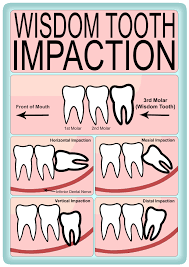Infection After Wisdom Teeth Removal
Having your wisdom teeth removed can be painful and can increase the risk of infection afterward. The sockets around the wisdom teeth are difficult to clean, so food particles and bacteria can become trapped there and cause infection. The symptoms of infection after wisdom teeth removal include swelling, redness, and pain. However, you can avoid these symptoms by following proper post-care instructions.
The chances of infection after wisdom teeth removal depend on the method of extraction and the aggressiveness of the surgery. To reduce the chances of an infection, avoid smoking and alcohol after surgery. You should also avoid strenuous activities until the healing process is complete. It is estimated that up to 25% of people who have their wisdom teeth removed will suffer from an infection. In rare cases, these infections can be serious and even life-threatening.
Read more: When Can I Eat Chips After Wisdom Teeth Removal
You should contact your oral surgeon if you notice any of these symptoms. If the infection is persistent, you may need to take an antibiotic. Your doctor may prescribe you with a new prescription after the current one expires. However, it is important to follow any medications carefully. If you stop taking the prescribed medication, you will risk reinfection of the infected area.
There are various treatments available for infection after wisdom teeth removal. Ice cubes can be applied to the jaw and mouth to reduce swelling. You may also want to avoid smoking, as this may delay healing. Smoking and poor nutrition can also delay the healing process. Additionally, empty sockets can lead to infection in the jawbone and gums. Fortunately, infection is a rare occurrence after wisdom teeth removal.
If the infection is severe enough, you may experience pain in the back of your mouth. If it spreads to the jaw and neck, you may develop a fever. The infection may also cause the lymph glands under your jaw to swell. It may also affect your ability to chew. In some cases, infection after wisdom teeth removal will lead to tooth decay.
Once your wisdom teeth are extracted, it is important to follow any post-op instructions from your dentist. Following these instructions will help the healing process and speed up your recovery. The dentist will usually prescribe antibiotics and clean the surgical area. You should avoid hot food and beverages for a few days. Also, it is important to rest, avoid heavy lifting, and avoid strenuous activities.
Delay-onset infection can develop a week or two after the tooth extraction. This infection is rare but can cause pain, fever, and swelling near the surgical site. If you experience any of these symptoms, you should call your dentist immediately. If the infection is severe, your dentist may perform surgical intervention to clean the diseased area. However, in some cases, an antibiotic medication will suffice.
Before scheduling a wisdom teeth removal appointment, discuss with your dentist the state of your wisdom tooth. An experienced dentist can perform the procedure quickly and with less pain and bruising. Recovery time depends on the complexity of the procedure . Deep impacted wisdom teeth require large amounts of bone to be removed, which means more pain and swelling and a slower recovery.

